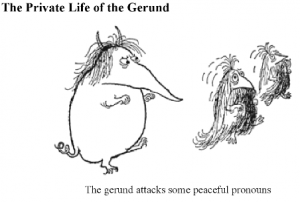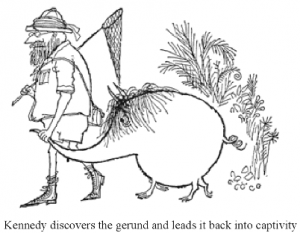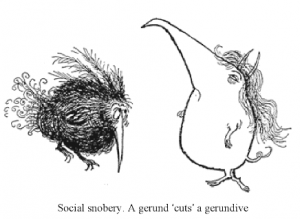Gerund: Difference between revisions
Jump to navigation
Jump to search
Amwelladmin (talk | contribs) No edit summary |
Amwelladmin (talk | contribs) No edit summary |
||
| Line 1: | Line 1: | ||
{{a|plainenglish| | {{a|plainenglish| | ||
[[File:Gerund_Pronouns.PNG|center| | [[File:Gerund_Pronouns.PNG|center|||frameless]] | ||
[[File:Gerund_Shut_Out.PNG|center| | [[File:Gerund_Shut_Out.PNG|center|||frameless]] | ||
[[File:Kennedy_Gerund.PNG|center| | [[File:Kennedy_Gerund.PNG|center|||frameless]] | ||
[[File:Gerund_cuts_gerundive.PNG|center| | [[File:Gerund_cuts_gerundive.PNG|center|||frameless]]}} | ||
A [[gerund]] is a {{tag|verb}} form which functions as a {{tag|noun}}, in {{tag|Latin}} having a (declinable) ending ''-ndum'', and in English ending in ''-ing'' | A [[gerund]] is a {{tag|verb}} form which functions as a {{tag|noun}}, in {{tag|Latin}} having a (declinable) ending ''-ndum'', and in English ending in ''-ing'' | ||
Latest revision as of 14:46, 15 December 2020
|
Towards more picturesque speech™
|
A gerund is a verb form which functions as a noun, in Latin having a (declinable) ending -ndum, and in English ending in -ing
Do you mind my doubting you? (as René Descartes once said to himself). “Do you want that throwing in the bin?” Compare with a gerundive, a verb which functions as an adjective.
Where better to end than the grate n molesworth the curse of st custards, as any fule kno.



